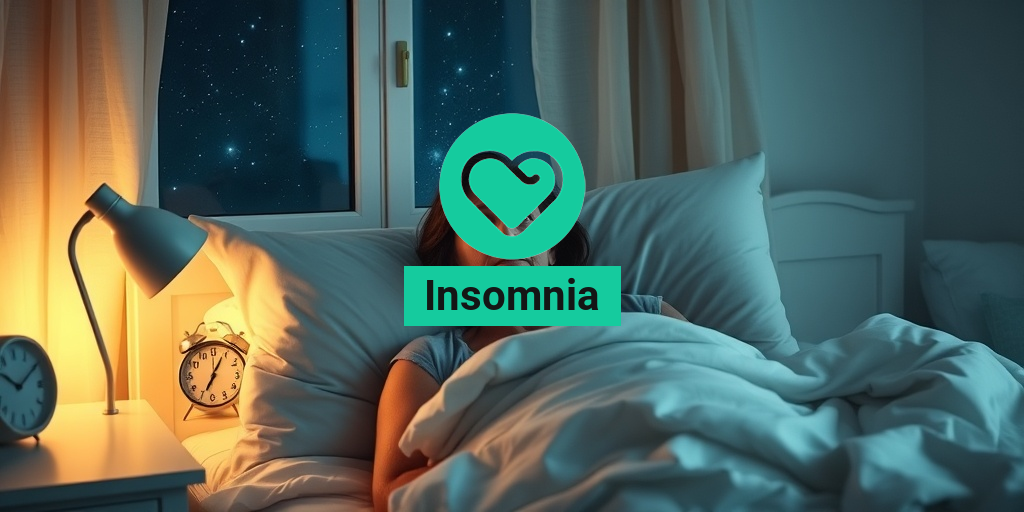What Is Insomnia?
Insomnia is a common sleep disorder that affects millions of people worldwide. It is characterized by difficulty falling asleep, staying asleep, or waking up too early and not being able to go back to sleep. This condition can lead to daytime fatigue, irritability, and difficulty concentrating, significantly impacting one’s quality of life.
The meaning of insomnia can vary from person to person, but it generally refers to a persistent pattern of sleep disturbances that can last for weeks, months, or even years. Insomnia can be classified into two main types: acute and chronic. Acute insomnia is often short-term and can be triggered by stress or significant life changes, while chronic insomnia occurs at least three times a week for three months or longer.
Understanding Insomnia Causes
There are numerous factors that can contribute to insomnia. Some of the most common insomnia causes include:
- Stress and Anxiety: Life events such as job loss, divorce, or the death of a loved one can lead to heightened stress levels, making it difficult to relax and fall asleep.
- Medical Conditions: Chronic pain, asthma, and other health issues can disrupt sleep patterns.
- Medications: Certain medications, including those for high blood pressure and depression, can have side effects that interfere with sleep.
- Substance Use: Caffeine, nicotine, and alcohol can all negatively impact sleep quality.
- Hormonal Changes: Women may experience insomnia during pregnancy or menopause due to hormonal fluctuations.
Understanding these causes is crucial for effective insomnia treatment. If you suspect that you are suffering from insomnia, it’s essential to consult a healthcare professional for a proper diagnosis and treatment plan.
Insomnia Symptoms
Recognizing the symptoms of insomnia is the first step toward addressing the issue. Common symptoms include:
- Difficulties Falling Asleep: Taking longer than 30 minutes to fall asleep can be a sign of insomnia.
- Frequent Awakenings: Waking up multiple times during the night and having trouble returning to sleep.
- Early Morning Awakening: Waking up too early and being unable to go back to sleep.
- Daytime Fatigue: Feeling tired, irritable, or unable to concentrate during the day.
- Sleep Disturbances: Experiencing restless sleep or nightmares.
In some cases, insomnia can lead to more severe conditions, such as chronic insomnia, which may require more intensive treatment options. If you find yourself experiencing these symptoms regularly, it’s important to seek help.
Seeking Help for Insomnia
There are various treatment options available for insomnia, ranging from lifestyle changes to medication. Some effective strategies include:
- Sleep Hygiene: Establishing a regular sleep schedule, creating a comfortable sleep environment, and avoiding screens before bedtime can significantly improve sleep quality.
- Cognitive Behavioral Therapy for Insomnia (CBT-I): This is a structured program that helps individuals identify and replace thoughts and behaviors that cause or worsen sleep problems.
- Medications: In some cases, doctors may prescribe medications such as melatonin or trazodone to help manage insomnia.
For more personalized advice and evidence-based health answers, consider visiting Yesil Health AI. They provide valuable resources that can help you understand and manage insomnia effectively.
In conclusion, insomnia is a complex condition that can significantly affect your life. By understanding what insomnia is, recognizing its symptoms, and seeking appropriate treatment, you can take steps toward achieving better sleep and overall well-being. 🌙💤

Types of Insomnia
Insomnia is a common sleep disorder that affects millions of people worldwide. It can manifest in various forms, each with its own unique characteristics and implications. Understanding the different types of insomnia can help you identify your symptoms and seek appropriate treatment. Here are the primary types of insomnia:
1. Acute Insomnia
Acute insomnia is a short-term condition that typically lasts for a few days to a few weeks. It is often triggered by stress, anxiety, or significant life changes, such as a new job or the loss of a loved one. Symptoms may include difficulty falling asleep, waking up frequently during the night, or waking up too early in the morning. This type of insomnia usually resolves on its own once the underlying stressor is addressed.
2. Chronic Insomnia
Chronic insomnia is defined as experiencing sleep disturbances at least three times a week for three months or longer. This type can be more complex, often linked to underlying health conditions, medications, or lifestyle factors. Individuals with chronic insomnia may find it challenging to maintain a consistent sleep schedule, leading to fatigue and impaired functioning during the day.
3. Comorbid Insomnia
Comorbid insomnia occurs alongside other medical or psychological conditions, such as depression, anxiety disorders, or chronic pain. In these cases, insomnia is not the primary issue but rather a symptom of another disorder. Treating the underlying condition often alleviates the insomnia symptoms.
4. Onset Insomnia
Onset insomnia refers to difficulty falling asleep at the beginning of the night. Individuals may lie awake for extended periods, feeling frustrated and anxious about their inability to sleep. This type can be particularly distressing, as it can lead to a cycle of worry about sleep that exacerbates the problem.
5. Maintenance Insomnia
Maintenance insomnia involves trouble staying asleep throughout the night. People with this type may wake up frequently and have difficulty returning to sleep. This can lead to feelings of exhaustion and irritability during the day, impacting overall quality of life.
6. Paradoxical Insomnia
Paradoxical insomnia is a unique condition where individuals believe they are not sleeping, despite evidence to the contrary. They may feel wide awake during the night but may actually be getting more sleep than they realize. This type can be particularly challenging to diagnose and treat, as the perception of sleeplessness can lead to increased anxiety and stress.
Causes of Insomnia
Understanding the causes of insomnia is crucial for effective treatment. Insomnia can stem from a variety of factors, including psychological, physiological, and environmental influences. Here are some common causes:
1. Stress and Anxiety
One of the most prevalent causes of insomnia is stress. Whether it’s work-related pressure, financial worries, or personal issues, stress can keep your mind racing at night, making it difficult to relax and fall asleep. Similarly, anxiety disorders can lead to persistent worry that disrupts sleep patterns.
2. Medical Conditions
Various medical conditions can contribute to insomnia, including:
- Chronic pain conditions, such as arthritis or fibromyalgia
- Respiratory issues, like asthma or sleep apnea
- Gastrointestinal problems, such as acid reflux
- Neurological disorders, including Parkinson’s disease
3. Medications
Some medications can interfere with sleep. Common culprits include:
- Antidepressants
- High blood pressure medications
- Cold and allergy medications that contain stimulants
If you suspect your medication is affecting your sleep, consult your healthcare provider for alternatives.
4. Lifestyle Factors
Your daily habits can significantly impact your sleep quality. Factors such as:
- Caffeine and nicotine consumption
- Irregular sleep schedules
- Lack of physical activity
can all contribute to insomnia. Establishing a consistent sleep routine and reducing stimulants can help improve sleep quality.
5. Environmental Factors
Your sleep environment plays a crucial role in your ability to fall and stay asleep. Consider factors such as:
- Noise levels
- Room temperature
- Light exposure
Creating a comfortable and dark sleeping environment can help mitigate these issues.
By understanding the types and causes of insomnia, you can take proactive steps to improve your sleep quality and overall well-being. If you continue to struggle with insomnia, consider seeking professional help for tailored treatment options. 🌙💤

Risk Factors for Insomnia
Insomnia is a common sleep disorder that affects millions of people worldwide. Understanding the risk factors for insomnia can help you identify whether you or someone you know is at a higher risk of experiencing this condition. Here are some of the most significant risk factors associated with insomnia:
Age
As we age, our sleep patterns often change. Older adults may experience more fragmented sleep and have a higher likelihood of developing chronic insomnia. This can be attributed to various factors, including medical conditions and medications that disrupt sleep.
Gender
Research indicates that women are more likely to experience insomnia than men. Hormonal changes, particularly during menstruation, pregnancy, and menopause, can contribute to sleep disturbances. For instance, pregnancy insomnia is a common issue faced by expectant mothers due to physical discomfort and hormonal fluctuations.
Stress and Anxiety
High levels of stress and anxiety can significantly impact your ability to fall asleep and stay asleep. Life events such as job loss, relationship issues, or financial troubles can lead to racing thoughts and worry, making it difficult to achieve restful sleep. If you find yourself lying awake at night, it may be due to the stressors in your life.
Medical Conditions
Several medical conditions can contribute to insomnia, including:
- Chronic pain conditions like arthritis or fibromyalgia
- Respiratory issues such as asthma or sleep apnea
- Gastroesophageal reflux disease (GERD)
- Neurological disorders like Parkinson’s disease or Alzheimer’s disease
These conditions can make it challenging to find a comfortable sleeping position or can cause frequent awakenings throughout the night.
Substance Use
The use of certain substances can also increase the risk of insomnia. Caffeine, nicotine, and alcohol are known to disrupt sleep patterns. While alcohol may initially make you feel drowsy, it can lead to fragmented sleep later in the night. If you’re struggling with insomnia, consider evaluating your consumption of these substances.
Medications
Some medications can interfere with sleep. Common culprits include:
- Antidepressants
- High blood pressure medications
- Allergy medications (especially those containing antihistamines)
If you suspect that your medication may be affecting your sleep, consult your healthcare provider for alternatives.
Lifestyle Factors
Your daily habits can also play a significant role in your sleep quality. Irregular sleep schedules, lack of physical activity, and excessive screen time before bed can all contribute to insomnia. Establishing a consistent sleep routine and creating a relaxing bedtime environment can help mitigate these risks.
Insomnia Diagnosis
Diagnosing insomnia involves a comprehensive evaluation of your sleep patterns, medical history, and lifestyle factors. If you’re experiencing persistent sleep difficulties, it’s essential to consult a healthcare professional for an accurate diagnosis. Here’s what you can expect during the diagnostic process:
Medical History Review
Your doctor will begin by asking about your medical history, including any existing health conditions, medications, and lifestyle habits. This information is crucial in determining potential underlying causes of your insomnia.
Sleep Diary
Keeping a sleep diary for at least two weeks can provide valuable insights into your sleep patterns. In your diary, note:
- The time you go to bed and wake up
- How long it takes you to fall asleep
- The number of times you wake up during the night
- Your overall sleep quality
This information can help your healthcare provider identify patterns and potential triggers for your insomnia.
Sleep Studies
In some cases, your doctor may recommend a sleep study, also known as polysomnography. This test monitors your sleep stages, heart rate, breathing, and other vital signs while you sleep. It can help diagnose conditions like sleep apnea or other sleep disorders that may be contributing to your insomnia.
Psychological Evaluation
Since insomnia can be linked to mental health issues such as anxiety or depression, a psychological evaluation may be necessary. This assessment can help determine if emotional or psychological factors are contributing to your sleep difficulties.
Understanding the insomnia meaning and its various aspects is crucial for effective treatment. By identifying risk factors and undergoing a thorough diagnosis, you can take the first steps toward achieving better sleep and improving your overall health. 🌙💤

Insomnia Treatment Options
Insomnia is a common sleep disorder that affects millions of people worldwide. It can lead to a variety of health issues, including fatigue, mood disturbances, and impaired cognitive function. Fortunately, there are several effective insomnia treatment options available to help individuals regain their sleep. Let’s explore some of the most popular treatments.
1. Cognitive Behavioral Therapy for Insomnia (CBT-I)
Cognitive Behavioral Therapy for Insomnia (CBT-I) is considered one of the most effective treatments for chronic insomnia. This structured program helps individuals identify and change thoughts and behaviors that contribute to sleep problems. CBT-I typically involves:
- Sleep Education: Understanding sleep cycles and the importance of good sleep hygiene.
- Stimulus Control: Associating the bed with sleep rather than wakefulness.
- Sleep Restriction: Limiting time spent in bed to improve sleep efficiency.
- Cognitive Restructuring: Challenging negative thoughts about sleep.
2. Medications for Insomnia
In some cases, insomnia medication may be necessary to help individuals achieve restful sleep. Common medications include:
- Benzodiazepines: Such as trazodone, which can help induce sleep but may lead to dependency if used long-term.
- Non-benzodiazepine Sleep Aids: Medications like zolpidem (Ambien) that are designed for short-term use.
- Melatonin Supplements: A natural hormone that regulates sleep-wake cycles, often used for sleep insomnia.
It’s essential to consult a healthcare provider before starting any medication to ensure it’s appropriate for your specific situation.
3. Lifestyle Changes
Making certain lifestyle changes can significantly improve sleep quality. Here are some tips:
- Establish a Sleep Routine: Go to bed and wake up at the same time every day, even on weekends.
- Create a Relaxing Bedtime Environment: Keep your bedroom dark, cool, and quiet.
- Avoid Stimulants: Limit caffeine and nicotine intake, especially in the hours leading up to bedtime.
- Exercise Regularly: Engaging in physical activity during the day can promote better sleep at night.
4. Alternative Therapies
Some individuals find relief from insomnia through alternative therapies. These may include:
- Acupuncture: This traditional Chinese medicine technique may help improve sleep quality.
- Yoga and Meditation: Practices that promote relaxation and reduce stress can be beneficial for sleep.
- Aromatherapy: Using essential oils like lavender may help create a calming atmosphere conducive to sleep.
Home Remedies for Insomnia
If you’re looking for natural ways to combat insomnia, several home remedies can help improve your sleep quality without the need for medications. Here are some effective options:
1. Herbal Teas
Drinking herbal teas before bedtime can promote relaxation and improve sleep. Some popular options include:
- Chamomile Tea: Known for its calming effects, chamomile can help reduce anxiety and promote sleep.
- Valerian Root Tea: This herb has been used for centuries to treat insomnia and anxiety.
- Lavender Tea: The soothing aroma of lavender can help calm the mind and prepare the body for sleep.
2. Warm Milk and Honey
A classic remedy, warm milk with honey can be a comforting bedtime drink. Milk contains tryptophan, an amino acid that promotes sleep, while honey can help regulate blood sugar levels during the night.
3. Essential Oils
Using essential oils in a diffuser or applying them topically can create a calming environment. Some effective oils for insomnia include:
- Lavender Oil: Known for its relaxing properties.
- Frankincense Oil: Can help reduce anxiety and promote a sense of peace.
- Ylang Ylang Oil: Often used to alleviate stress and improve sleep quality.
4. Sleep-Inducing Snacks
Eating the right snacks before bed can also help improve sleep quality. Consider options like:
- Bananas: Rich in potassium and magnesium, which can help relax muscles.
- Almonds: A source of melatonin and magnesium.
- Oatmeal: Contains melatonin and can be a warm, comforting bedtime snack.
By incorporating these home remedies for insomnia into your routine, you may find it easier to drift off to sleep and enjoy a more restful night. 🌙✨

Frequently Asked Questions about Insomnia
What is Insomnia?
Insomnia is a sleep disorder characterized by difficulty falling asleep, staying asleep, or waking up too early and not being able to go back to sleep. This condition can lead to daytime fatigue, mood disturbances, and decreased performance in daily activities.
What are the common symptoms of Insomnia?
- Difficulty falling asleep
- Waking up frequently during the night
- Waking up too early
- Daytime fatigue or sleepiness
- Irritability or mood swings
- Difficulty concentrating
What causes Insomnia?
There are various factors that can contribute to insomnia, including:
- Stress and anxiety
- Medical conditions
- Certain medications
- Poor sleep habits
- Caffeine or alcohol consumption
How can Insomnia be treated?
Treatment for insomnia may involve:
- Cognitive Behavioral Therapy for Insomnia (CBTI)
- Medications such as melatonin or trazodone
- Improving sleep hygiene
- Relaxation techniques
Is there a connection between Insomnia and pregnancy?
Yes, many women experience pregnancy insomnia due to hormonal changes, physical discomfort, and anxiety about childbirth. It’s important to discuss any sleep issues with a healthcare provider during pregnancy.
What is chronic Insomnia?
Chronic insomnia is defined as having difficulty sleeping at least three times a week for three months or longer. It can significantly impact overall health and quality of life.
Are there any natural remedies for Insomnia?
Some natural remedies that may help with insomnia include:
- Herbal teas (like chamomile or valerian root)
- Establishing a regular sleep schedule
- Creating a relaxing bedtime routine
- Limiting screen time before bed
What is fatal Insomnia?
Fatal insomnia is a rare genetic disorder that leads to progressively worsening insomnia, ultimately resulting in severe mental and physical deterioration. It is a serious condition that requires medical attention.
Where can I find Insomnia cookies near me?
If you’re looking for insomnia cookies, you can use online maps or delivery apps to find the nearest locations. Many bakeries offer delicious cookies that can be enjoyed as a late-night snack!
What is the meaning of Insomnia?
The term insomnia comes from the Latin word “insomnia,” which means “sleeplessness.” It refers to the inability to sleep or stay asleep, affecting many individuals at some point in their lives.
Are there any apps that can help with Insomnia?
Yes, there are several apps designed to help manage insomnia by providing sleep tracking, relaxation techniques, and sleep hygiene tips. Look for apps that focus on mindfulness and sleep improvement.




